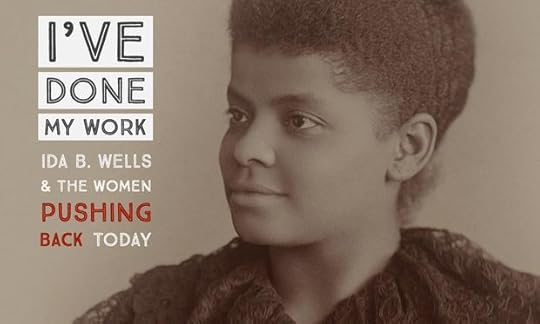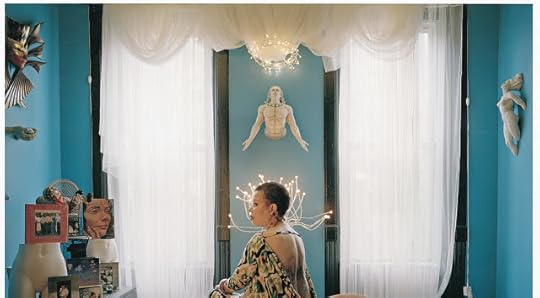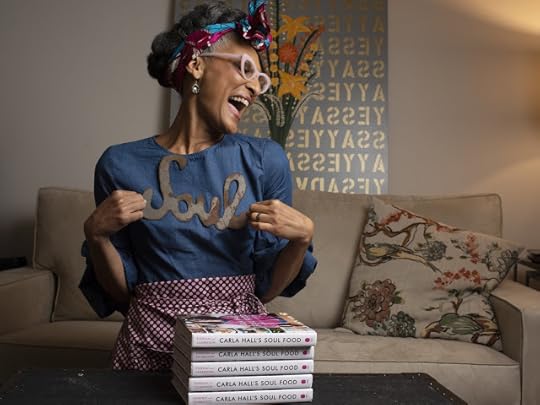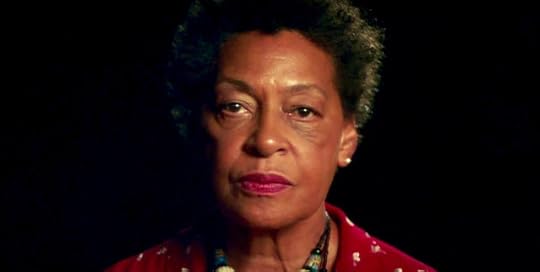Mark Anthony Neal's Blog, page 426
October 29, 2018
'The Cash Ceiling: Why Only the Rich Run for Office -- And What We Can Do about It
 'Why are Americans governed by the rich? Millionaires make up only three percent of the public but control all three branches of the federal government. How did this happen? What stops lower-income and working-class Americans from becoming politicians? Nick Carnes' new book,
The Cash Ceiling: Why Only the Rich Run for Office - And What We Can Do about It
, provides a compelling and comprehensive account of why so few working-class people hold office―and what reformers can do about it. Carnes is a faculty member at the Sanford School of Public Policy at Duke University.' -- DukeSanfordSchool
'Why are Americans governed by the rich? Millionaires make up only three percent of the public but control all three branches of the federal government. How did this happen? What stops lower-income and working-class Americans from becoming politicians? Nick Carnes' new book,
The Cash Ceiling: Why Only the Rich Run for Office - And What We Can Do about It
, provides a compelling and comprehensive account of why so few working-class people hold office―and what reformers can do about it. Carnes is a faculty member at the Sanford School of Public Policy at Duke University.' -- DukeSanfordSchool
Published on October 29, 2018 09:43
I've Done my Work: Ida B. Wells and The Women Pushing Back Today
 'On this live episode of The United States of Anxiety: Gender and Power, WNYC’s Kai Wright explores the life of Ida B. Wells and her decision as a young woman activist to take on a deadly fight, and not let up. Wright is joined by Wells biographer Paula Giddings and cultural critic Jamilah Lamieux, along with other panelists.'-- The Greene Space at WNYC & WQXR
'On this live episode of The United States of Anxiety: Gender and Power, WNYC’s Kai Wright explores the life of Ida B. Wells and her decision as a young woman activist to take on a deadly fight, and not let up. Wright is joined by Wells biographer Paula Giddings and cultural critic Jamilah Lamieux, along with other panelists.'-- The Greene Space at WNYC & WQXR
Published on October 29, 2018 09:32
October 28, 2018
“somebody/anybody / sing a black girl’s song”: Remembering Ntozake Shange by Lisa B. Thompson
 Photo Credit: Deana Lawson
Photo Credit: Deana Lawson“somebody/anybody / sing a black girl’s song”: Remembering Ntozake Shange by Lisa B. Thompson | @DrLisaBThompson | NewBlackMan (in Exile)
somebody/anybody sing a black girl’s song bring her out to know herself to know you but sing her rhythms – Ntozake Shange, For Colored Girls Who Have Considered Suicide When the Rainbow is Enuf
I walked into Ntozake Shange’s classroom at UCLA as a senior English major. The lecture hall was packed to the brim and buzzing with loud talk and silent nods of acknowledgment. It seemed that everybody black on campus was in that room—not just the poets, but the BSA crew, the jocks, the Black Greeks, even the math majors. We all signed up so we could be blessed by her theatrical genius. I sat in the back nervous and excited waiting for the woman I worshiped since I was a nappy headed middle school girl in the Bay Area.
I’ll never forget hearing the For Colored Girls commercial in 1978 on KDIA—Oakland’s black radio station: “without any assistance or guidance from you i have loved you assiduously for 8 months 2 wks & a day.” Denied a ticket to the show by my mother because I was “too young for all that” I found a way to buy a copy of the book. Every weekend I showered my girlfriends with angst and drama filled performances as the Lady in Green.
On that sunny morning at UCLA Ntozake Shange glided into the room like royalty. No, that’s not right. Not like royalty, she entered that room as royalty. She began the class with a free-write; she asked us to write whatever we liked for a few minutes. Students grabbed their notebooks and that buzz of excitement switched to a thick beat of concentration. We were at work in the presence of a queen. I sat there and wrote non-stop until she called time. She invited us to take the floor to share what we created. The room fell silent.
I don’t know what gave me the gall to stand, but I did. I read to that room the first monologue I had ever written in my life. In that few minutes I transformed from a poet to a playwright. Ntozake Shange’s presence in that room and her presence in American theater changed the course of my life as an artist. Her bold work and spirit gave me permission that I didn’t know I was waiting for as a colored girl who was in love with words and the worlds that they create.
Shange’s class was memorable for so many reasons, too many to share here. I’ll end with two. She invited one of her friends to visit class because he had a new play opening in Westwood. Her friend was George Wolfe, and his play? The Colored Museum. Yes, she shared her magnificent friends with her students. That is why I try to do the same with my own students. I’ll never forget the final day of class. We met in the theater and she shared her new work in progress. It was chillingly brilliant work that brought the AIDs crisis for black people into sharp relief. She was fierce and unapologetic about telling deep truths in ways that linger with audiences long after the curtain comes down.
I always assign Shange’s choreopoems, and books when I teach playwriting or my Staging Black Feminism graduate seminar because it’s important for those coming up now to understand how she revolutionized theater while also helping to shape the course of black feminism. When I saw Ntozake Shange two years ago she was kind to say she remembered me from that UCLA class. She congratulated me on the upcoming Crossroads Theatre production of Single Black Female. That night I told everyone within earshot that I was her former student and that I owed her a debt of gratitude for my career as a playwright. May her light continue to shine in the work of the artists inspired by her groundbreaking contributions to black feminist theatre and black culture.
+++
Lisa B. Thompson is an award winning playwright, teacher and scholar. The University of Texas at Austin professor is the author of Beyond the Black Lady: Sexuality and the New African American Middle Class and the plays Monroe, Underground, and Single Black Female . The world premiere of her play The Mamalogues will be staged in August 2019 at Austin’s Vortex Repertory Company co-produced by Color Arc Productions.
Published on October 28, 2018 07:24
October 26, 2018
How Slick Rick And Queen Latifah 'Breathed Life Into Hip-Hop' In 1988
 '1988 was a colossal year for hip-hop. Soon-to-be-classic albums from Public Enemy, N.W.A., Run-D.M.C, Boogie Down Productions and more solidified the artform birthed from the Bronx as a viable and music industry-funded endeavor. Stretch Armstrong and Bobbito Garcia, who host NPR's
What's Good
podcast, remember the hip-hop revolution circa 1988. "It's the last time there was truly a meritocracy where the best artists sold the most amount of records based on the fact that they were dope," Bobbito Garcia says.' -- All Things Considered
'1988 was a colossal year for hip-hop. Soon-to-be-classic albums from Public Enemy, N.W.A., Run-D.M.C, Boogie Down Productions and more solidified the artform birthed from the Bronx as a viable and music industry-funded endeavor. Stretch Armstrong and Bobbito Garcia, who host NPR's
What's Good
podcast, remember the hip-hop revolution circa 1988. "It's the last time there was truly a meritocracy where the best artists sold the most amount of records based on the fact that they were dope," Bobbito Garcia says.' -- All Things Considered
Published on October 26, 2018 20:34
In Soul Food Cookbook, Chef Carla Hall Celebrates Black Culinary Heritage
 'For a long time, the celebrity chef Carla Hall says, she failed to appreciate the food she grew up with. The book reflects her personal journey to embrace the meaning and depth of African-American foodways.' -- Morning Edition
'For a long time, the celebrity chef Carla Hall says, she failed to appreciate the food she grew up with. The book reflects her personal journey to embrace the meaning and depth of African-American foodways.' -- Morning Edition
Published on October 26, 2018 20:27
Republicans Split a Black College in Half in Extreme North Carolina Gerrymandering
 'Black students at HBCU North Carolina Agricultural and Technical State University (North Carolina A&T State University) are calling out Republicans' aggressive gerrymandering that split their college in two. Republicans' redistricting divided the black college to win elections. This form of GOP gerrymandering is not anything new or surprising in politics and the age of Donald Trump.' -- NowThis News
'Black students at HBCU North Carolina Agricultural and Technical State University (North Carolina A&T State University) are calling out Republicans' aggressive gerrymandering that split their college in two. Republicans' redistricting divided the black college to win elections. This form of GOP gerrymandering is not anything new or surprising in politics and the age of Donald Trump.' -- NowThis News
Published on October 26, 2018 19:57
"Sorry, I'm Washing My Hair" — Rhea Dillon Explores the Particularities of Afro Upkeep
 'For the latest episode of our hit series Define Beauty—the second in a four-part editorial collaboration with Dazed Beauty—director and photographer Rhea Dillon explores what it means to plan and manage her hair. While most hair adverts depict the natural ease of 'wash and go' white hair, Dillon conceives of an advertising landscape where non-white hairstyles are the norm, while also exploring the ways in which "the crown" she holds on her head is "laden with politics and societal pressures".' -- NOWNESS
'For the latest episode of our hit series Define Beauty—the second in a four-part editorial collaboration with Dazed Beauty—director and photographer Rhea Dillon explores what it means to plan and manage her hair. While most hair adverts depict the natural ease of 'wash and go' white hair, Dillon conceives of an advertising landscape where non-white hairstyles are the norm, while also exploring the ways in which "the crown" she holds on her head is "laden with politics and societal pressures".' -- NOWNESS
Published on October 26, 2018 19:39
Robin DiAngelo: Being Nice is Not Going to End Racism
 'Dr. Robin DiAngelo is Affiliate Faculty at the University of Washington. Her book White Fragility: Why It's So Hard For White People To Talk About Racism debuted on the New York Times Bestseller list -- "For so many white people we think that the answer to racism is friendliness. If you notice the evidence that most white people will give for why they’re not racist, one of their top pieces of evidence is “I know people of color. I have friends of color”.' -- Big Think
'Dr. Robin DiAngelo is Affiliate Faculty at the University of Washington. Her book White Fragility: Why It's So Hard For White People To Talk About Racism debuted on the New York Times Bestseller list -- "For so many white people we think that the answer to racism is friendliness. If you notice the evidence that most white people will give for why they’re not racist, one of their top pieces of evidence is “I know people of color. I have friends of color”.' -- Big Think
Published on October 26, 2018 19:14
Historian Nell Irvin Painter: Going to Art School for Undergraduate Degree After Retirement
 'After building a successful career as a historian at Princeton, Nell Irvin Painter decided to retire and begin a new career as an artist. She went back to college for another undergraduate degree and is exploring what it means to start over.' -- AtlanticLIVE
'After building a successful career as a historian at Princeton, Nell Irvin Painter decided to retire and begin a new career as an artist. She went back to college for another undergraduate degree and is exploring what it means to start over.' -- AtlanticLIVE
Published on October 26, 2018 19:11
The Future of Art According to Carrie Mae Weems
 'As an artist who has broken barriers in a field that has historically excluded women and people of color, Carrie Mae Weems both acknowledges her overlooked predecessors and recognizes her own capacity to empower the next generation. “I have to use my skin and my body to push for an even wider path, so that another group of young artists who are coming behind me can work, and live, and be, and produce more easily than ever before,” she says in this film. She also celebrates the increased effort among institutions to include marginalized voices, and ultimately envisions a future of art that is enriched by the diversity of its participants.' -- Artsy
'As an artist who has broken barriers in a field that has historically excluded women and people of color, Carrie Mae Weems both acknowledges her overlooked predecessors and recognizes her own capacity to empower the next generation. “I have to use my skin and my body to push for an even wider path, so that another group of young artists who are coming behind me can work, and live, and be, and produce more easily than ever before,” she says in this film. She also celebrates the increased effort among institutions to include marginalized voices, and ultimately envisions a future of art that is enriched by the diversity of its participants.' -- Artsy
Published on October 26, 2018 19:03
Mark Anthony Neal's Blog
- Mark Anthony Neal's profile
- 30 followers
Mark Anthony Neal isn't a Goodreads Author
(yet),
but they
do have a blog,
so here are some recent posts imported from
their feed.



